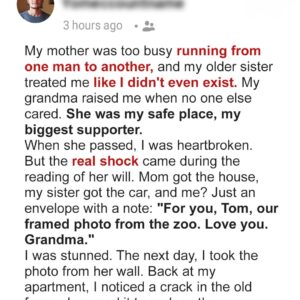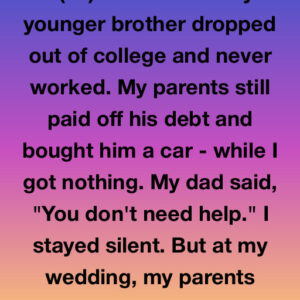When my 14-year-old son, Mason, asked to live with his dad after the divorce, I said yes.
Not because I wanted to — I would have kept him close forever if I could — but because I didn’t want to stand in the way of a father and son trying to rebuild something. I told myself I was doing the right thing. Giving space, not giving up. But in truth, the decision quietly broke me.
At first, he called often — selfies, burnt pancakes, late-night movies with his dad, Eddie. I replayed those messages again and again, whispering: He’s okay. This is good.
Then the calls slowed. Texts came less often. Replies turned into single words.
And then, silence.
The first hints came from his teachers.
“Missing homework.”
“Seems distracted.”
And then the one that pierced:
“He was caught cheating on a quiz. He looked… lost.”
That word stayed with me. Lost.
Not rebellious. Not lazy. Just lost.
I called him. No answer. I called Eddie, careful not to sound accusing — that tightrope every divorced parent knows.
“He’s a teenager, Claire,” Eddie sighed. “You’re overthinking again.”
That phrase — you’re overthinking — had followed me since Mason’s baby years, when I cried on the bathroom floor holding a screaming newborn while Eddie slept through it. He said it then, and he said it now. But this time, I couldn’t ignore the instinct that told me something was deeply wrong.
So one Thursday afternoon, I drove to Mason’s school without asking permission. The sky was gray, the kind of rain that blurs the edges of everything.
When he climbed into the car, my heart broke. His hoodie clung to his shoulders, his eyes hollowed, his whole body small.
He whispered, “I can’t sleep, Mom. I don’t know what to do.”
The truth came out in fragments: Eddie had lost his job weeks earlier. He hadn’t told anyone. Bills piled up. The fridge was almost empty. Mason had been eating crackers and peanut butter, doing homework by flashlight, keeping secrets to protect us both.
“I didn’t want you to think less of him,” he said quietly.
That was when I understood — he wasn’t rebelling. He was drowning.
That night, I took him home. No debates, no permissions. Just a mother’s instinct.
He slept for 14 hours.
The next morning, he asked if I still had his old robot mug — the one with the chipped handle. When I handed it to him, he smiled, small and tired.
I filed for custody soon after — not out of anger, but out of mercy. I didn’t want to punish Eddie. I just couldn’t let Mason keep holding up a house that was falling apart.
Healing took time. He barely spoke at first. I made the home soft, predictable, safe. I left notes on his door:




